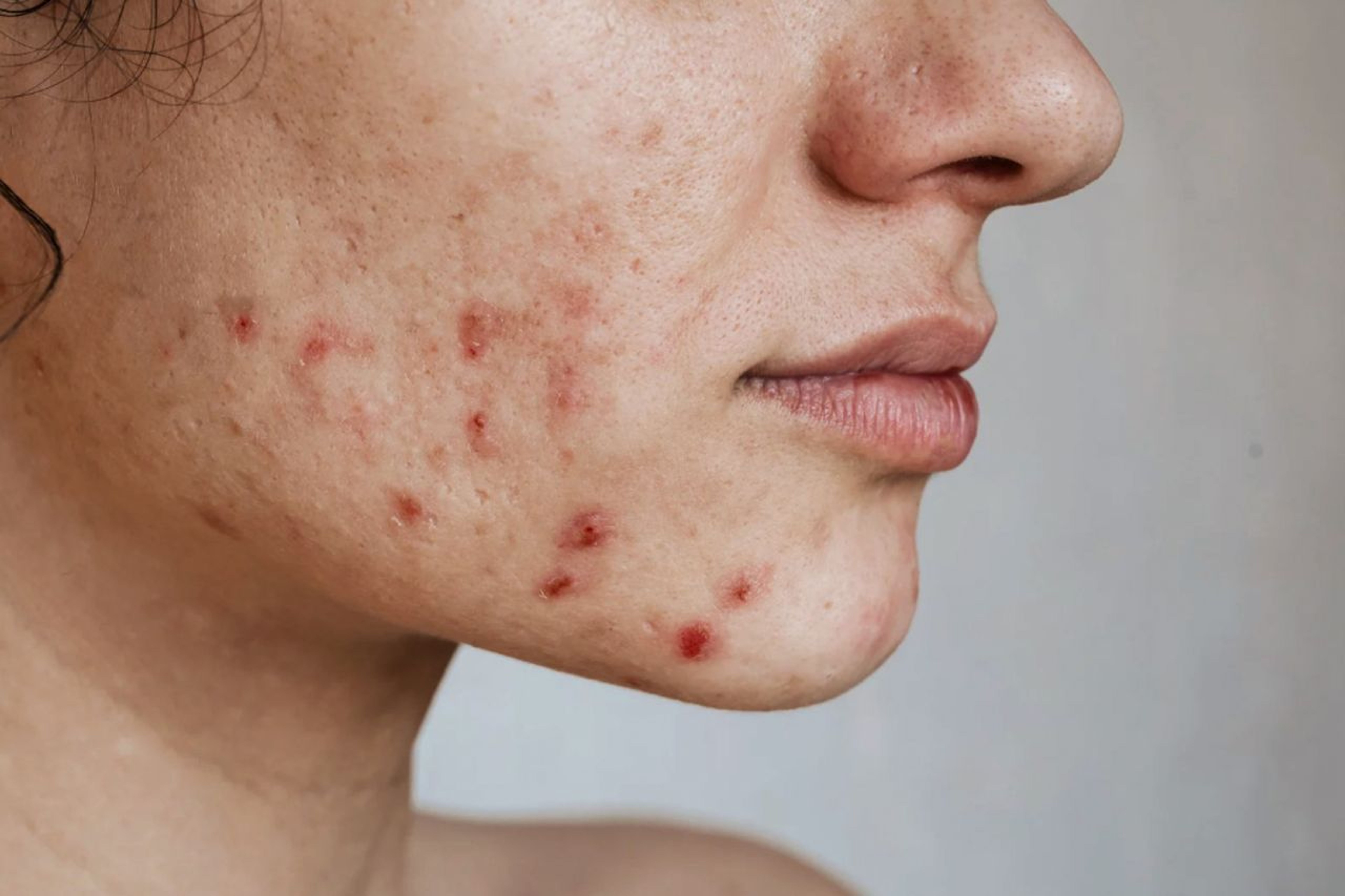
- Acne treatment
The relationship between diet and acne
Written by: Editors
Modified on:
The link between diet and acne is a complex area, with reactions to food varying significantly from person to person. Before considering any changes to your diet, it’s crucial to do so under the guidance of a professional. These experts can create a tailored plan that takes into account your individual needs, potential undiagnosed allergies, and health goals. Recent research shows that certain dietary choices can both worsen and improve acne. Let’s explore what this means and what insights science has to offer.
Let’s start with the facts from recent research on the origins of acne, also known as acne vulgaris. Factors influencing the development of acne include:
- Genetics
- Hormonal fluctuations
- Inflammation
- Environmental influences
Diet has played an integral role in the acne discussion for decades, and recent studies offer some fascinating insights.
What does sugar do to your skin?
Recent research into the glycaemic index (GI) of food highlights the impact of sugar on acne. A four-week study involving regular chocolate consumption showed an increase in acne, particularly among male participants. Further studies suggest that low glycaemic diets may benefit people with acne. Reducing sugar intake and opting for whole grains, vegetables, and fruits appears to be helpful.
Studies confirm that high glycaemic index foods can trigger acne by causing spikes in blood sugar levels. Avoiding high-GI foods and choosing low-GI options, such as whole grains, seems beneficial.
Research also highlights the benefits of a low glycaemic load diet, associated with smaller sebaceous glands, reduced inflammation, and a decrease in pro-inflammatory interleukin-8 (which can contribute to inflammation). These positive effects support improved acne outcomes and reduced oil production.
Dairy and proteins
Dairy, particularly its proteins, is also under scrutiny. Some studies suggest that certain proteins in dairy may stimulate the development of acne.
It may be wise to consider not only the fat content of dairy but also its protein content.
Alternatives like almond or oat milk are being explored. Studies on dairy and acne have produced mixed results. Here are reasons why dairy may influence acne:
Hormones | Contains natural hormones that can affect hormone balance | Hormonal fluctuations and acne development | Hormones can stimulate oil production |
|---|---|---|---|
Insulin resistance | Affects insulin resistance, reducing the body’s response to insulin | Raises blood sugar levels, which can influence inflammatory responses and acne | |
Inflammation after dairy consumption | Leads to increased inflammatory responses in some people | Can cause or worsen inflammation |
Which food groups should you avoid?
Food group | Examples | Notes |
|---|---|---|
Sugary products | Soft drinks, sweets, pastries | Contain added sugars and often have a high glycaemic index (GI). |
Refined grains | White bread, sugary cereals | Typically have a high GI and can cause rapid increases in blood sugar. |
Starchy vegetables | Boiled potatoes | While nutritious, potatoes can have a high GI, especially when boiled. |
Fast food options | Processed carbs, sugars | Many fast food options contain processed carbs and sugars, raising their GI. |
What foods might be a healthy choice?
Research suggests that diets rich in omega-3 fatty acids, found in fish and healthy oils, may benefit people with acne. Adding foods like salmon and olive oil to your diet can positively impact skin condition.
Probiotics, a new beginning?
Recent studies are investigating the effects of probiotics on acne, and while the results are promising, more research is needed to confirm these findings.
Key points from research
Research into the relationship between diet and acne continues to evolve, and this remains a complex and sometimes controversial area.
- Individual variation plays a crucial role. People differ significantly in genetics, lifestyle, diet, and hormonal profiles. What works for one person may not work for another, making it difficult to draw broad conclusions.
- When evaluating studies, it’s important to consider methodological limitations, such as small sample sizes, short study periods, self-reported food intake, and variability in study designs. These limitations can affect the reliability of the findings.
- Be aware of publication bias: studies with positive results are more likely to be published, which can give a skewed view of the available literature.
- It’s crucial to critically assess scientific evidence, given the lack of a universal approach to diet and acne.
Seeking advice from healthcare professionals, such as dermatologists or nutritionists, is recommended for an individual assessment of needs and responses.
Sources
https://oersterk.nu/blogs/acne-waarom-een-huidspecialist-ook-naar-voeding-zou-moeten-kijken/
https://www.voedingscentrum.nl/encyclopedie/glycemische-index.aspx
https://www.thuisarts.nl/acne/ik-heb-puistjes-acne-wat-kan-ik-doen
https://pubmed.ncbi.nlm.nih.gov/26711092/
https://pubmed.ncbi.nlm.nih.gov/32748305/
https://www.gezondheidsplein.nl/aandoeningen/acne/acne-en-voeding/item124376
https://www.webmd.com/skin-problems-and-treatments/acne/ss/slideshow-acne-best-worst-foods